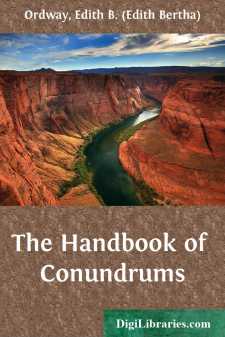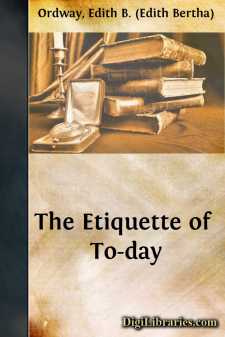Categories
- Antiques & Collectibles 13
- Architecture 36
- Art 48
- Bibles 22
- Biography & Autobiography 813
- Body, Mind & Spirit 142
- Business & Economics 28
- Children's Books 14
- Children's Fiction 11
- Computers 4
- Cooking 94
- Crafts & Hobbies 4
- Drama 346
- Education 46
- Family & Relationships 57
- Fiction 11829
- Games 19
- Gardening 17
- Health & Fitness 34
- History 1377
- House & Home 1
- Humor 147
- Juvenile Fiction 1873
- Juvenile Nonfiction 202
- Language Arts & Disciplines 88
- Law 16
- Literary Collections 686
- Literary Criticism 179
- Mathematics 13
- Medical 41
- Music 40
- Nature 179
- Non-Classifiable 1768
- Performing Arts 7
- Periodicals 1453
- Philosophy 64
- Photography 2
- Poetry 896
- Political Science 203
- Psychology 42
- Reference 154
- Religion 513
- Science 126
- Self-Help 84
- Social Science 81
- Sports & Recreation 34
- Study Aids 3
- Technology & Engineering 59
- Transportation 23
- Travel 463
- True Crime 29
The Handbook of Conundrums
Categories:
Description:
Excerpt
INTRODUCTION
A conundrum is a riddle in the form of a question, the answer to which involves a pun. Originally the term was applied to any quaint expression. It is thus, in its modern form, a union of the elaborated riddle and the impromptu pun.
With the earliest development of intelligence came the discovery of likeness and difference in things, and the search for analogy was carried out along both sensible and absurd lines, the latter drifting into a double analogy of thought and form, of which the conundrum is the logical product.
The literatures of all peoples contain the riddle, which might be witty or serious as impulse prompted. All bright and clever minds have seen the possibilities of the pun, and so common is it as an impromptu form of wit among keen people, so general the temptation to fall into it, that it is looked upon with disfavor, as a pitfall for thought, which often prevents it from finishing its course.
The conundrum has, however, an ancient and honorable lineage, and, while not often given its precise form in conversation or anecdote, is readily adapted to the permanent embodiment of those flashes of wit which enlighten and cheer.
The ability to guess and to propound riddles was held in high respect in early times. Men of great physical prowess were expected to guess riddles to prove their mental prowess, and many were the contests of this sort which were held. The stakes in these contests were very high,—often life or honor. In Norse mythology the prize of such a contest was once the daughter of the god Thor; in another the life of the giant Vafthrudnir was forfeit when he failed to win in competition with the god Odin.
So in the old English ballad of the Elfin-knight, a maiden saves herself from an evil spirit by successfully guessing his riddles. Among many primitive peoples the game of riddle-reading was played with opposing sides, each headed by a champion, and with bets staked on the outcome. Often in ballads and folklore the hero's escape from death and final triumph hinge upon the guessing of a riddle.
The Semitic people held in high regard the power to read riddles, and this power, as in the story of Solomon, blends with the higher intelligence which makes for wisdom.
Perhaps the most famous of Hebrew conundrums is that of Samson, the strong of intellect as of body, who, when he found the honey which the wild bees had placed in the carcass of a lion, read to the Philistines this riddle: "Out of the eater came forth meat, and out of the strong came forth sweetness."
Among the Greeks and Romans, as among earlier peoples, all forms of wit and play of word and fancy were tried and popular. D'Israeli, in his "Curiosities of Literature," records that "It is certain that Cicero was an inveterate punster; and he seems to have been more ready with them than with repartees."
The story of the famous riddle of the Sphinx comes down from Greek mythology. The city of Thebes was infested by a monster having the body of a lion and the upper part of a woman. She lay crouching upon a rock near a narrow pass which led to the city, and propounded to all travelers a riddle, allowing all who guessed to pass safely, but killing all who failed. The uniform failure of all who came, and their subsequent slaughter, made great lamentation in the city. Œdipus, the unacknowledged son of the King of Thebes, who had shortly before unknowingly killed his father, undertook to rid the city of the monster. He boldly confronted the Sphinx, who asked him the riddle, "What animal is it that in the morning goes on four feet, at noon on two, and in the evening upon three?" Œdipus replied, "Man, who in childhood creeps on hands and knees, in manhood walks erect, and in old age goes with the aid of a staff." The Sphinx thereupon cast herself from the rock and perished, and the Thebans made Œdipus king.
See Gayley's "Classic Myths in English Literature and in Art" (Boston, Ginn and Company, 1911)....



